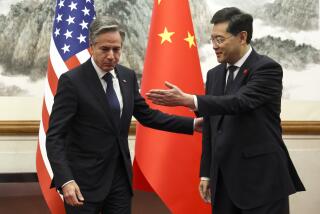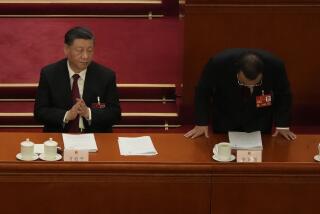China Ousts Its Culture Minister, Appoints Hard-Liner
- Share via
BEIJING — Minister of Culture Wang Meng, who for three years presided over a gradual liberalization in Chinese arts, has been fired, and a leading hard-line official has been appointed to act in his place, Chinese media announced Monday.
The official New China News Agency reported that Wang, 54, a respected author, had asked to step down “to concentrate on writing and literary criticism.”
But Wang’s removal, which had been rumored for days, is widely viewed as part of a continuing purge of reformist officials associated with former Communist Party General Secretary Zhao Ziyang, who was removed from his post in June after opposing the use of martial-law troops to suppress student-led pro-democracy demonstrations.
In a related development, news services reported that the governor of Hainan province, Liang Xiang, has also been fired. Liang, 70, also an associate of Zhao, is the highest-level provincial official to be removed from office.
Western diplomats said his firing would have implications for foreign investors and for China’s economic reforms, because Hainan had been slated to take the lead in the country’s experiments with capitalistic forms of trade and investment.
The pro-Communist Hong Kong newspaper Wen Wei Po, which reported Liang’s dismissal Sunday, said the governor is under investigation for corruption.
Replaced by Hard-Liner
Wang’s replacement apparently will be He Jingzhi, a recently appointed vice minister of culture, who is a poet but whose reputation is primarily that of a hard-line propagandist.
He, who most recently has been deputy head of the Communist Party Propaganda Department, had served previously as a vice minister of culture. He was reappointed to that post last week and was also named acting head of the ministry, state-run television reported Monday. He also has been named head of the Communist Party structure within the ministry.
Wang, who became minister of culture in 1986, encouraged a loosening of controls on literature and the arts. Among the most dramatic symbols of the new openness were several controversial art shows in Beijing during the last year, including one devoted entirely to paintings of nudes.
He, in contrast, has been a leading advocate of ideological orthodoxy. He played key roles in promoting a 1983 campaign against “spiritual pollution” and an “anti-bourgeois liberalization” drive in 1987. Both campaigns were aimed at attacking Western influences.
New Wave of Criticism
Since this June’s crackdown against pro-democracy demonstrators, and Zhao’s fall from power, a new wave of criticism has been launched against pornography and any literature viewed as advocating allegedly decadent foreign life styles. This new campaign now is likely to get a further boost from He.
“Literary and art circles are part of the ideological front,” He declared in an April, 1987, speech, during the height of that year’s anti-bourgeois liberalization campaign. “Our opposition to bourgeois liberalization is aimed at strengthening our Marxist world outlook and our Marxist concept of literature and art. . . . We must advocate depicting the bright side of things and depicting advanced and heroic figures. Only by doing so can we inspire the people to stride forward.”
He is considered a protege of former Propaganda Minister Deng Liqun, a hard-line ideologue who has been in semi-retirement since 1987 but who remains one of the orthodox figures most feared by reformist intellectuals.
Some Chinese say that Deng, who was removed from the Communist Party Central Committee in 1987, has recovered considerable political clout since the June crackdown.
More to Read
Sign up for Essential California
The most important California stories and recommendations in your inbox every morning.
You may occasionally receive promotional content from the Los Angeles Times.













